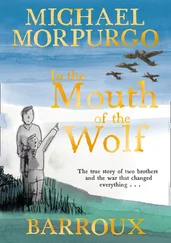Later that night as we walked the two blocks to my grandparents’ house, my uncles muttered to one another about the incident and I kept a respectful silence. Uncle Mike was urging Tom to be cautious.
“Watch your back door with that guy,” I heard him say.
Tom’s voice was so low I almost missed his answer. “I ain’t worried about Philly. Jesus, Mike, I was overseas, people tried to kill me over there, for Christ’s sake. What’s that punk gonna do to me?”
“Just be careful, is all I’m telling you.”
“I got no interest in a beef with Philly Clark. I couldn’t care less if I can take him or he puts my lights out. I just wanta take his girl away.”
Uncle Mike growled in irritation and seemed to give up. I thought that made it my turn, so just as we reached our house, I tossed in my two cents’ worth.
“Are you gonna have a fight with that guy, Uncle Tom?”
They both spun around and Uncle Mike looked irritated.
“You’re not supposed to listen to our conversations,” he said, but Uncle Tom looked amused.
“How’s he supposed to do that, huh? We’re both jawin’ away like he’s not here. He supposed to put gumballs in his ears, or what?”
He paused at the broken gate, hands in his pockets, looking calm and confident. “No. I don’t fight with street trash no more, I’m retired, like Joe Louis. That guy gives me any lip, I’ll sic you and your cousin Matt on him.” He shot a quick grin at me and then led me into the house. My grandmother, after her perfunctory mutterings about how late they’d kept me out, put me into bed. I was exhilarated by what I had seen, and bothered by it as well, with its hint of potential danger for yet another of my loved ones, and the one I already prized most. I went to sleep that night daydreaming about a heroic encounter between my uncle and Philly Clark, and in my version, the big man in the fancy clothes took a fearful drubbing from my uncle to the cheers of hundreds of onlookers.
A later version, edited and refined many times, had my uncle lying temporarily stunned on the ground as I administered an incredible beating to his assailant.
Uncle, Hero, and Film Critic
I was baffled that my uncle had an enemy, that any adult would harbor hostile feelings for him. The moment that Tom had broken the news to me about my parents, he had moved into the center of my universe. This was no dramatic shift in my feelings: he’d long occupied a spot just behind my parents in my pantheon of adult heroes. It was a natural spot for him: my father had been a quiet, reserved man uncomfortable with noise and childish craziness. My father worked two jobs and had little time of his own, but Tom had been a frequent visitor to our house. Tom was outgoing and charming, and what was more amazing than anything else, he seemed to find me good company. “He’s found another little boy to play with,” my Aunt Anne kidded. Early on, before I understood the concepts of family and relatives, I was fond of telling anyone who would listen that my uncle was “my special friend.”
None of this changed when I moved into my grandparents’ home. I looked forward to the moment when Tom returned from work, and though he never showed irritation with me, I know that I followed him through the house like a stray dog, assaulted him with my questions and news of my day, and hung on him like a second skin.
He worked at the Borden Dairy in what was always called “The Old Neighborhood,” over near Grandma Dorsey’s flat. Once Grandpa Flynn took me to visit him at work and he gave me little bottles of chocolate and strawberry milk. In the evenings he went out with his friends or with my grandfather, sometimes to watch a fight or a ballgame at one of the countless taverns in the neighborhood—there seemed to be one on every corner, adults apparently drank their way through life—and at other times I knew he was going out, inexplicably, with girls.
His personal routine and habits fascinated me: he listened to music a great deal, sang when he was working on a task around Grandma’s house or drying the dishes for my grandmother, and at times I caught him talking to the singers on Grandma’s yellow radio: “Sing it, Frank, show ’em how it’s done,” he’d say to Sinatra. “Ah, you’re beautiful, Peggy,” I heard him tell Peggy Lee, and then he caught me watching from the next room, and grinned. “She gives me fever, kid,” he told me, and I was embarrassed. And when Rosemary Clooney invited him to “Come on to My House,” he’d laugh. “Oh, I’ll come to your house, all right, Rosie.”
Sometimes at night my grandparents would turn on the big GE in the living room and listen to the Barn Dance or Tennessee Ernie. “You’re turning into a couple of old hillbillies,” he’d tell them, laughing, but he liked the fiddle music and the sad songs, and after my many hours listening to Grandpa’s Irish music, his songs of lost loves and country, I could hear the similarities and thought it was all Irish music. Tom even sang along with some of these country singers. He’d get serious when the girl singers sang their sad stories: “I’d take care of you, Honey,” he’d say.
I felt sorry for the sad girls, I wished they could meet my uncle. He didn’t have anyone special that I could see, and after the incident at Riverview I shared Uncle Mike’s hope that Tom would forget about the unnamed girl I’d heard them talking about. Whoever she was, she meant trouble for him, one way or the other.
Once I saw him break into a jitterbug to Grandma’s big yellow kitchen radio. They’d told me about his dancing—Aunt Anne told me he was the best dancer in the neighborhood. “Oh, he’s grand,” Grandma agreed. The dancing part made me uneasy. It was one thing to sing in the kitchen, but I wasn’t sure a boy was supposed to like dancing, let alone excel at it. But it was fascinating to watch him and, in the end, I decided that if Uncle Tom liked it, there had to be something in it. I tried it myself once, alone in the kitchen with the music, and fell over one of the kitchen chairs. Grateful that I’d had no audience, I decided it wasn’t for me.
It was also through his example that I learned the rewards of reading in the bathroom. He was fond of reading in the bathtub—no, that doesn’t come close to it: he was unable to get into the tub without a paper or magazine. Once when my grandmother upbraided him for the time he took in the tub—“You’ll get pneumonia,” was one of her arguments, “You’ll get your death of cold,” and, “It’s bad for your skin to soak so long in warm water,” were others—I heard him play his black ace: he told her that this was the result of Korea.
“I sat up there on that hill, Ma, and I thought about getting out of there like anybody else, and I thought about you, Ma, and I wanted to be warm and clean someplace, I wanted to be home. But the thing I kept thinking about was a hot bath. A hot bath. And I promised myself I’d never hurry through one again—just in case … you know, in case I get sent back to Korea.”
“Oh, God forbid!” she muttered, but she left him alone after that.
Also—and predictably—he read on the toilet. I learned this one morning on his day off, the morning that was to keep him forever associated in my mind with blood. I was in the living room rifling through my box of lead soldiers trying to find enough men with heads to make a squad and he emerged from the bathroom looking like a leper. Tiny pieces of tissue were stuck to his face and blood seeped through each one. He seemed unmoved by this predicament.
“Hey, Butch. You got some comics around, don’t you?”
I must have been staring, for he repeated the question and I responded with another.
“What happened to your face?”
Читать дальше












